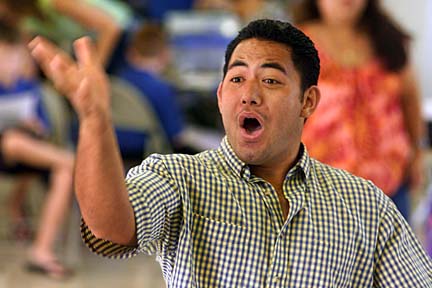
Members of the Honolulu Boy Choir stretch their arms during practice. They are getting ready for a trip to Washington, D.C., where they will perform at the National Festival of the States World War II Memorial Dedication.
Spotlight raises
boys’ self-awarenessThe director of the Honolulu Boy Choir
promotes discipline with a ready smile
Twelve-year-old Chris Peterson has lots of stars and a smiley face sticker on his name tag, showing that he has passed tests for memorization of lyrics, and has smiled throughout practice of the Honolulu Boy Choir.
He turns on the beaming grin -- his "Honolulu Boy Choir smile" -- at the request of his father, something he practices while singing in front of the mirror.
"I saw my 7-year-old (when Chris first started) standing at attention for 90 minutes, focusing 100 percent on the choir director," said his father, Jim Peterson, noting that 7-year-olds normally don't do that.
Peterson said his son's school test scores rose and he made a very large jump in a year in self-discipline and memorization.
Smiling is important for Honolulu Boy Choir members as music director Kaimi Pelekai repeatedly emphasized during a serious, yet light-hearted rehearsal for their trip to Washington, D.C., Memorial Day weekend.
The choir is fine-tuning the patriotic songs they will perform in the 2004 National Festival of the States World War II Memorial Dedication.
An expressive Kaimi Pelekai, choral director for the Honolulu Boy Choir since 1999, directs the boys during rehearsal.
Pelekai, who has been director of the choir since 1999, said being in the choir "is much more than just singing."The strict training develops "self-control and self-awareness ... they become conscious of their behavior. In the beginning, a boy has no clue that he's scratching his nose or moving his arm. They're taught not to just react, and it helps in their school and personal lives. They develop confidence and self esteem."
Getting the boys to smile is not a problem for Pelekai, whose natural "local boy" sense of humor generates giggles as at one point during rehearsal when he exclaims in exaggerated dismay, "What is that!?" while scratching his calf with his other foot.
"What if I did this in the middle of a concert? Would it look good?! Try not to scratch!"
After the boys miss their cue for the third time, Pelekai suddenly falls on the floor, yelling, "Stop! You missed it! Don't pay attention to the soloists! If you don't come in when you have to, what they do loses its whole effect!"
Pelekai's shirttails are untucked after an hour of extremely animated directing, but his fitness level as a firefighter has come in handy for this position.
A former choir member, Pelekai said he gets "real joy" from his job -- "It's exciting to see kids grow."
Calder Atta, an 11-year-old Punahou student, is a veteran choir member after 3 1/2 years, earning two solo spots on the Washington tour.
His round face is one of the most expressive among his peers, who are all trained to wear their feelings on their faces. He has loved to sing since the first grade and no longer feels nervous performing in front of large groups of people.
Atta sings the opening to "Coming to America" in the sweetest of sopranos and with all the passion he imagines of immigrants seeking refuge in this country.
Atta and all the boys enjoy being with the group even though the standards are demanding. They say that learning to stand still was the hardest.
Kaleo Ruperti-Young, 8, of Moanalua Elementary, said standing still was "pretty hard. You can't scratch or move around. I used to scratch my arms and head ... And if we're not on time (to a concert), we can't perform. It happened to me once."
Zack Oyafuso, 11, of Stevenson Middle School, said, "You have to stand up straight, you have to focus on the director, you have to smile and you gotta sing good."
Oyafuso is "very nervous" about singing in Washington, especially about soloing on the first verse of "Look for the Silver Lining." But the hard work is worth it, because "I like seeing people's reaction at the end of the show and they tell us how good we are," he added.
Rose Haywood, mother of Matthew, agreed. "They raise the bar."
"And this means parents must usually "spend over an hour a night" helping their sons memorize the words to all the songs, provided on CD and worksheets at the beginning of the season. With a lot of the songs in Hawaiian and other ethnic cultures, it's even harder -- "it's a shock to the system," she added.
But the boys learn "all sorts of good stuff -- team building, voice training," Haywood said.
Pelekai said the 30 boys who are going to Washington are ready for the big event.
"These boys always rise to the occasion and never fail to amaze me," he said.
Honolulu Boy Choir
http://www.honoluluboychoir.org

